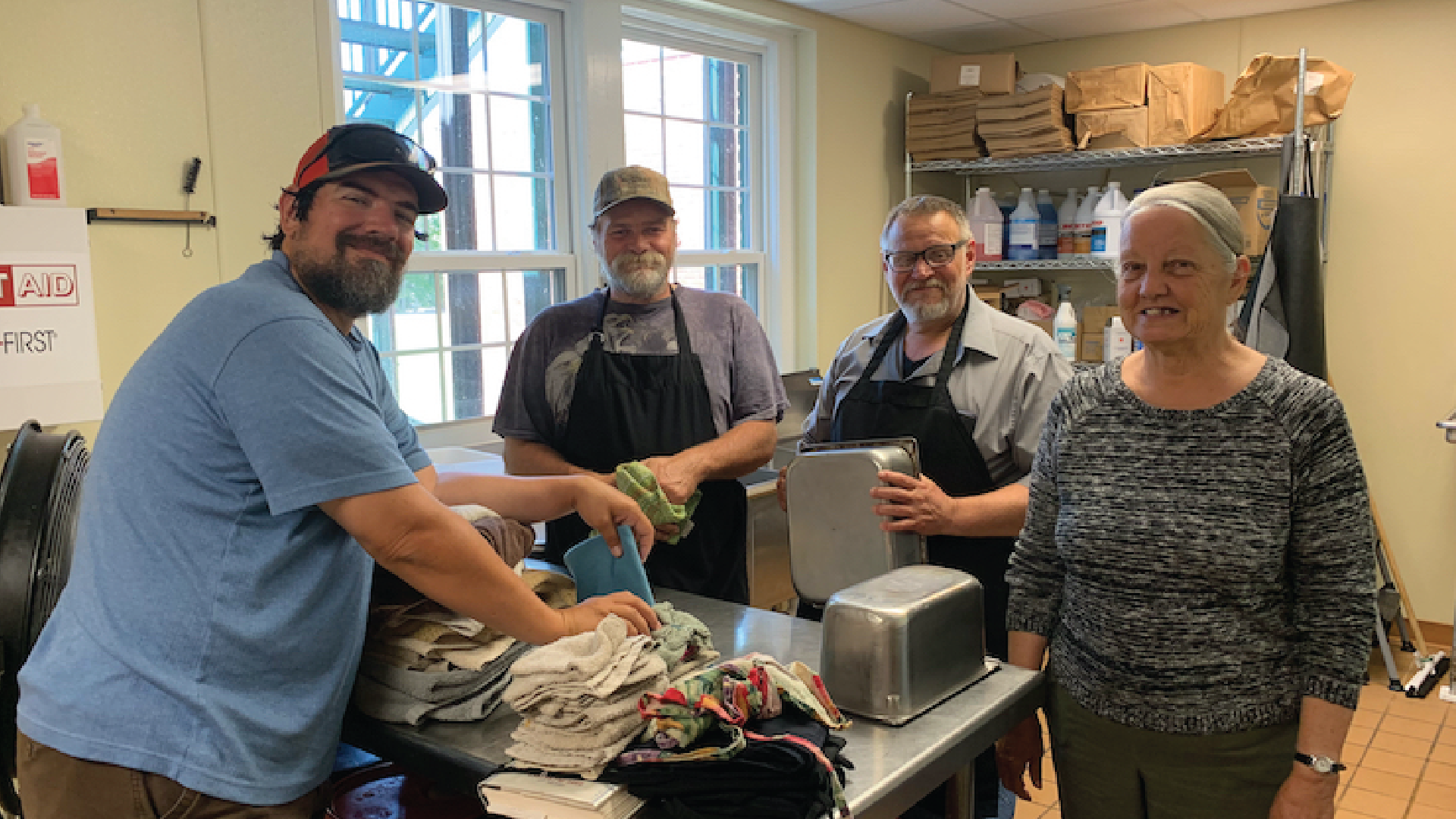Forging Past the Felony: How Character and Relationships Make All the Difference

Savannah Aleckson
Events Director
Read more from Savannah
“If you have a strong enough character, people don’t care about your criminal record, your disabilities, the addictions you’ve had,” Rich Schaus, Executive Director of the Muskogee Gospel Rescue Mission, asserts. “That’s what we’re trying to develop in the men and women here–undeniable virtue that makes the past irrelevant.”
Rich sees the sad but familiar story play out every day in his role at the Oklahoma mission: So many men and women with criminal backgrounds are ready to turn over a new leaf in their lives but encounter roadblocks at every turn.
“It’s everything from getting car insurance to finding a place to live. Some car insurance companies won’t cover you if you have a felony, even if the felony had nothing to do with driving. Landlords see it as too risky a move to let someone with a criminal record live on their property, particularly if it’s a drug-related charge,” Rich explains.
Perhaps the biggest obstacle for former felons Rich sees is finding employment.
“Everyone knows that people who have felonies on their record have a hard time getting a job,” Rich says. “And, sure, every community has a list of ‘felon-friendly’ employers.” While a step in the right direction, Rich laments the little-known fact that many of these employers will put applicants with felonies at the bottom of their list, only hiring them “if they’re desperate enough.” Though it is possible in some cases to get a record expunged, it’s expensive and time-consuming. Even still, in the internet age, a record is never truly erased–it’s not uncommon that a potential employer will discover a criminal charge through an old article or a news story from years ago.
These hurdles can make a return to a life of crime seem tempting or even unavoidable to those who face them.
“Survival instinct is strong in people,” Rich reminds. So often, people make bad choices that can look inexplicable from the outside, but Rich’s encouragement is to view people’s lives and choices in context.
“People will do what they need to survive. If they learn that in spite of effort to do the right thing that they can’t care for themselves and their families, that presents a strong incentive to stealing or selling drugs or whatever you used to do to provide for yourself.”
While these are difficult obstacles indeed, Rich shares the good news that they are not insurmountable. In his estimation, there are three essential elements to a successful strategy for getting over the hurdles: the returning citizen must undergo demonstrable character change that makes past wrongs irrelevant, relationships must be fostered with employers so they feel more comfortable taking calculated risks on men and women with rough histories, and the nonprofit leader must be willing to act as a mediator between the former felon and community connections.
Character Change
One way in which Rich helps men and women develop strong character is through his four-week class, Forging Past the Felony. While primarily geared toward guests at the Muskogee Gospel Rescue Mission, the class is open to the community, including people with loved ones who have criminal records.
“A lot of what we do in that class comes down to reprogramming,” Rich shares. “It’s helping people rethink their habits, their mindset, and their identity.”
Over the course of four weeks, participants learn about their purpose as humans created in God’s image, they take time to evaluate the relationships in their lives and identify connections that need healed, and they work on developing new, healthy habits.
When Forging Past the Felony participants have completed the program, Rich invites them to meet regularly with him one-on-one for mentoring and coaching. It’s during this time that they identify individual challenges and create a game plan to address them.
Regarding the power of demonstrable character change, Rich shares a success story: One program participant landed a desk job at a local hotel in spite of her rough criminal history because the employer didn’t run a background check for this entry-level position. She excelled at her job and eventually found herself in the running for the manager position at that hotel.
“At that point, the employer ran a background check and was shocked at what he found in her past. There’s no way he would have hired her for a management position with a rap sheet that long, had he not known her,” Rich explains. “But, because he had gotten to know her and witnessed firsthand her character and strong work ethic, he decided to take a chance and offered her the management position.”
Today, that same woman has advanced to regional manager in that hotel chain, overseeing multiple hotels in a four state area. She has undeniably advanced to a stable position in life–and it was dually thanks to her new-found character and an employer willing to take a chance on her.
Form strong relationships with employers:
The next critical component Rich identifies is nonprofit leaders forming strong relationships with employers in the community, knowing that they’re more likely to take a risk on someone with a rough past if that person is recommended by someone they know.
“It’s like developing a friendship,” Rich explains. “I don’t immediately approach them about whether they’re willing to hire someone who’s gone through our programs.”
Instead, Rich will typically ask to meet up for coffee with a community employer to explain more about the programs at Muskogee Gospel Rescue Mission. From there, he sets up a tour of the mission, making sure to explain their WorkStart program designed to create job preparedness. The WorkStart program is a different program from Forging Past the Felony, but the two often work in tandem.
“While that person is touring, I make sure to ask him things like, ‘What are the skills you need in an employee? What are you looking for in a potential new hire?’” Rich shares. And those questions are not just performative – Rich really listens to what employers want and need. To demonstrate that he takes their feedback seriously, Rich sends the employer a document detailing expectations for each level of the food service track of the WorkStart program, thanking them for specific advice they were able to give that Rich added to the document.
Allowing employers to see how they measure growth in job preparedness also equips Rich to be able to explain where a program participant is at in objective terms. “When I get to the point that I’m sending guys over to an employer to be considered for employment, I’m always honest about where they’re at. I’ll let them know that they’re a level 2, having grown in soft skills and now learning to lead. Or, I can share that they’ve progressed to a level 4 and are now supervising all other workstart work tract participants,” Rich explains. Because the employer has been familiarized with the program, Rich and the employer are able to speak frankly about the applicant’s ability in mutually understood terms.
“At the end of the day though, employers need to know that I’m not just some bleeding heart. I’m only going to send applicants that I actually think will do a good job, and I’ll always be honest about where they’re at.” This often requires Rich to have difficult conversations with shelter guests when they have not yet proven themselves when a job opportunity comes up.
On that note, Rich encourages other leaders working with returning citizens to not take it personally if they do lose out on an opportunity by dropping out or doing a poor job. “If you’ve built a relationship with an employer, he or she will understand. It may take them a while to try again, but you can build back.”
Mediate between ex-felons and employers:
Rich sees mediation between former felons and employers in the community as a critical part of his role: He helps each group understand the other better and encourages them to build bridges.
As an example, Rich helps participants in Forging Past the Felony strategize about how to talk about their past in a way that doesn’t close doors of opportunity.
“We had one woman who went through the class who wanted to be a buyer for Macy’s –helping choose the products they sell in store. As we were helping her prepare for her interview, we encouraged her to be honest about her past as someone who sold drugs,” Rich shares. While honesty was emphasized, Rich helped her think through how to talk about in a way that made sense to the employer, including talking about the necessary skills she was excited to use in a much healthier context. She was gifted in networking, understanding what makes a good product that’s appealing to customers, and selling, and she was ready to put those skills toward something healthy and beneficial now that she had turned over a new page.
Sometimes, the mediation role means opening up lines of communication and facilitating making things right.
One Forging Past the Felony participant shared with Rich that he had, years before when he was living in addiction and crime, stolen about $400 of product from a local Walmart. Though he was never caught, the man had undergone significant character change and felt convicted that he needed to take $400 from his paycheck at his new job and give it back to that Walmart.
Fortunately, Rich knew the Walmart store manager. He was able to ply his social connections to arrange a meeting with him. As a show of support, he accompanied the nervous man to the meeting.
“It was so humbling to see this jail-hardened man so strongly convicted and yet trembling at the same time as he handed the manager the money and apologized,” Rich recalls.
Rich shares that the store manager later called him to tell him that he was going to push for a re-evaluation of their policy regarding hiring felons as a result of that man’s courageous act to make things right. Had Rich not been willing to leverage his social connections to arrange and attend that meeting, the store manager may never have gotten to experience this perspective shift. As is, the story is a testament to the power of character change and leveraged social capital in changing people’s preconceptions.
“I love these men and women. I was so tired of seeing them stuck,” Rich shares about why he started the Forging Past the Felony program four years ago. “I want to help them define a new direction in their lives and make that new direction so evident that it’s undeniable to the people around them.”
The Muskogee Gospel Rescue Mission is a member of the True Charity Network. You can connect with Executive Director Rich Schaus in the member’s directory.





Leave a Reply
Want to join the discussion?Feel free to contribute!